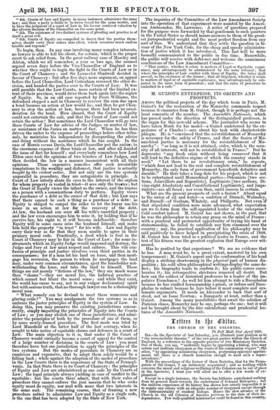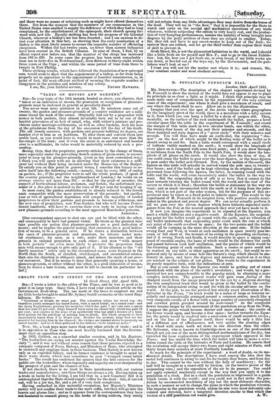Titters to Or thin. THE CHURCH IN THE COLONIES.
79 Pall Mall, 21st April 1851. Sin—In the Spectator of last Saturday, you illustrate your position as to " the irreconcilable theories " of the two great parties within the Church of England, by a reference to the opposite practice of two Missionary Societies. One of them, you say, "uniformly begins by appointing a bishop, who may ordain and institute clergymen as the wants of his communion require"; the other, "by appointing ministering clergymen, postponing episcopal appoint- ments till there is a church numerous enough to need such a super- intendence."
With the proceedings of the former of these Societies, that for the Propa- gation of the Gospel, I am intimately acquainted ; and as nothing which concerns the moral and religious wellbeing of the Colonies can be out of place in the Spectator, I trust you will allow me to offer a few words of ex- planation. Except in a single instance, the Society has hitherto contributed nothing from its general funds towards the endowment of Colonial Bishoprics ; but the uniform experience of its history has shown how utterly impossible it is ' to supply any colony with an adequate number of clergymen except through the instrumentality of resident bishops. Hence the slow advance or the Church in the old Colonies of America previous to the date of their in- dependence. Few well-qualified niissionanes could be found in this country,
and there were no means of ordaining such as might have offered themselves there. But from. the moment that the members of our communion in- the United States were enabled to supply the deficiency of which they bad so long complained, by the establishment of. the episcopate, their church sprang for-.
word' with life. Equally striking has been thesprogrees of the Colonial Church, wherever a hishop'esee-has been founded; and I am anxious to di-, root your attention to this fact, as- showing that the early nomination of a bishop is the most likely, means to secure the requisite, number of officiating clergymen. Within the last twelve years, no fewer than sixteen bishoprics have been erected in the British Colonies. In-nine of these, I find,. by an official report now before me, that the number of the clergy has increased from 183 to 420. In some cases the progress has been most remarkable': from ten to forty-five in Newibundland; from thirteen to thirty-eight within. three years at the Cape and within the same period of time from three to twenty in Port Phillip.
These striking results, which have followed the foundation of new episcopal sees, would seem to show that the appointment of a bishop, so far from being properly set in opposition to the appointment of humbler nits' sionaries, is, in point of fact, the most efficient method of securing the requisite number of clergymen in the parishes-and missions of any colony.



























 Previous page
Previous page